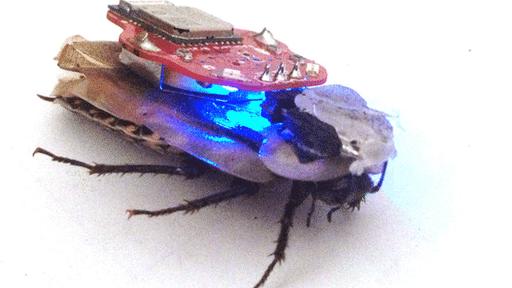TEDGlobal welcomes robot cockroaches
- Published

A project aimed at creating cyborg cockroaches is being launched at the TEDGlobal conference in Edinburgh.
The insects, intended as a neuroscience learning tool, are controlled via a mobile phone.
The Technology, Entertainment and Design conference specialises in showcasing new technologies.
The theme of this year's conference is "think again", and the line-up of speakers is diverse, including a monk and a self-styled gentleman thief.
Among the technology on offer this year will be RoboRoach, the brainchild of neuroscientist Greg Gage.
The cyborg insect is created by attaching a backpack that communicates directly with neurons in the cockroach's antennae.
The neurons convey information back to the insect's brain using electricity.
The cockroach needs to undergo what Mr Gage calls "short surgery under anaesthetic" in order to have wires placed inside the antennae.
The backpack is detachable
Then the backpack can be placed on the insect and its movements controlled via a mobile phone or other device.
The backpack communicates directly with neurons in the cockroach's antennae, allowing users to set the direction in which the insect moves.
Mr Gage will take to the TED stage on Wednesday to demonstrate what the insect can do.
"This is not just a gimmick, the technique is the same as that used to treat Parkinson's disease and in cochlear implants," he told BBC News.
"The point of the project is to create a tool to learn about how our brain works."
He said that the team had thought a lot about the ethics of using insects in this way.
"We are pretty certain that this doesn't impose pain on the insect and they still have free will because they adapt very quickly and ignore the stimulation," he said.
However the Royal Society for the Prevention of Cruelty to Animals (RSPCA) has now told the BBC it has concerns.
"The RSPCA believes it is inappropriate to encourage children to dismantle and deconstruct insects," said a spokesperson.
"The fact that the neuroscientist is 'pretty certain' that this doesn't impose pain is, frankly, not certain enough."
"There are already plenty of fascinating studies involving insects which can help children to learn - and ones that do not deliberately harm insects."
Hands-on learning
Mr Gage heads up Backyard Brains, a start-up of scientists and engineers aiming to change the way neuroscience is taught. The kits are primarily aimed at schools.
"The audience for this is teachers. We would like to see this in more high schools," he said.
Already budding neuroscientists have made some interesting discoveries, with high school children in New York working out that the pace at which the insects adapt to the stimulation can be slowed by randomising the signal.
"This is a hands-on way of understanding the properties of neurons and doing critical thinking about how they work," said Mr Gage.
Children had already made some good discoveries using the kit, said Mr Gage
"One in five people will have a neurological disorder in their lives and there are often no cures for them. Getting kids interested in neuroscience is important."
The team is launching a Kickstarter campaign, external aiming to raise $10,000 (£6,400) to develop the hardware, which will be made in Michigan.
The kits come with backpacks, batteries and electrodes as well as optional insects, The insects could not be shipped outside of the US but could be sourced locally, said Mr Gage.
- Published28 February 2013
- Published27 February 2013
- Published29 June 2012
